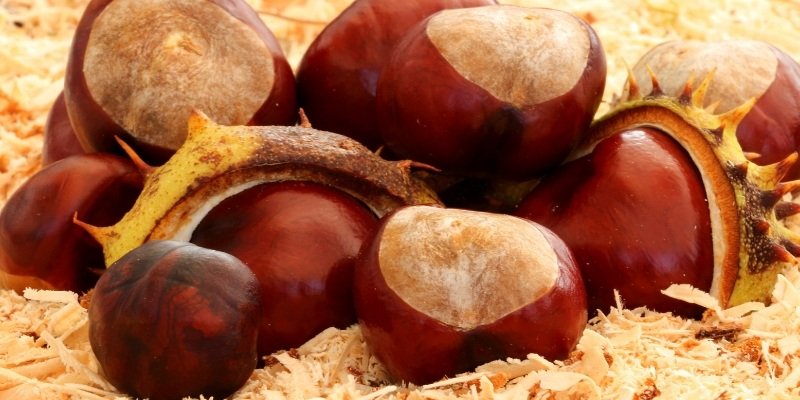Are you interested in a particular subtopic about dogs and chestnuts? Then use the table of contents below to jump to the most relevant section. And you can always go back by clicking on the black arrow in the right bottom corner of the page. Also, please note that some of the links in this article may be affiliate links. For more details, check the Disclosure section at the bottom of the page.
Chestnuts are high in fiber. One hundred grams of chestnuts have 3 grams of fiber, which is even more than in walnuts. (And check our guide on “Can dogs eat walnuts?” for more details about that) We all aware that fiber helps keep us fully energized as it lifts our blood sugar levels. We also know that chestnuts are a safer’ quick fix’ of hunger and unhealthy cravings in comparison with others as tasty foods. Chestnuts are rich in omega-fatty acids as well. But is chestnut something that your pup can benefit from too?

So can dogs have chestnuts?
The obvious answer is, yes. But with the caveats. Pets may eat chestnuts, but only in minimal amounts, especially when the percentage of starch in their nutrition is already high. Pets, unlike human beings, can not metabolize starch as successfully.
Significant portions can result in severe diarrhea that can lead to abdominal pains or even pancreatitis in severe cases if medical emergency treatment is not quickly available. However, these nuts are not harmful to dogs as The American Society for the Prevention of Cruelty to Animals® (ASPCA®) established.

Are chestnuts bad for dogs?
Overall, it is always better to add tinier chestnut servings to your pet’s diet until you see its reaction. You can gradually modify the size of the chestnut portion if you notice no allergies or any other unusual behavior and if your pup seems to enjoy the new treat.
A small portion of chestnuts should be good for your dog as long as they have been cooked in the right way (refer to the section about “dog-friendly chestnuts…”). Roast, grilled and salted chestnuts would be a clear and obvious thing to avoid. Salt alone isn’t good for dogs. And It is even more harmful to combine salt with high fiber and fatty food.
Possible allergies are yet another drawback. Then make sure you’re taking your dog to the vet if after giving your dog chestnuts if you’ve noticed something strange in pup’s behavior.
Or, in case you want to save money and time better while being efficient in helping your pup with poop problems, you might check online vets.
The best premium pet insurance, the one that covers things like accidental food poisoning, that might lead to constipation, averages at about $42.45 as calculated by Valuepenguin in their extensive research. But even still, the median reimbursement level is at 80%. In the end, you have to pay quite a lot for every visit to your doctor.
So, companies like “Just ask” might be a great option in that case. It’s an online support with hundreds of qualified vets on call to help you in a second for a tiny fraction of the cost. So you don’t have to drive anywhere or worry that your doctor is out office.

Are chestnuts good for dogs?
Yes. Chestnut is a higher energy meal, with 100 g of roast chestnut containing 245 kcal. Boiled or baked, chestnuts are very popular and delightful foods. Protein, good fats and also rich in vitamin A, c, potassium, phosphorus, calcium, magnesium, sulfur, chlorine, iron, copper and manganese -those are just some of the nutrients in the chestnuts.
Since it is potassium-rich and low in sodium, it is very beneficial for dogs at risk of renal and cardiovascular diseases. So, there’s a lot of good things for pups in chestnuts.

Making those chestnuts dog-friendly…
The simplest way to share chestnuts with dogs is to mash them, paste them and mix them with typical pup’s food.
Before making a paste, peel the skin from the chestnuts as it can be difficult for dogs also to digest. Before, ensure you don’t season the paste. Try to boil the chestnuts and blend them to make a delicious paste. This way your pup will be happy that he eats something new and good for him.

Chestnuts for dogs. Summary
Although chestnuts are tasty and nutritious, adding them to your dog’s nutrition is not necessary. Your dog has already got enough vitamins and minerals from canine’s typical food, so it’s not a must to add something like chestnuts for the sake of additional nutrients.
You can always put a bit of chestnut to dog’s meal, to spice things up a bit, of course, since they are healthy for your canine. But remember this isn’t something essential or vital to the health of your dog.
Credits: thanks for the cover photo to Canva.


